Tshisekedi says that Congo will permanently ban exporters of cobalt who breach quotas.
President Felix Tshisekedi warned that the Democratic Republic of Congo would permanently ban exporters of cobalt who violated its new quota-based system. The world's largest producer is tightening controls to reduce fraud and stabilize prices.
Congo, which produces 70% of all cobalt in the world, stopped exports of this critical metal for electric batteries after its prices fell to a record low.
In September, the Congo's state mineral regulator ARECOMS announced that a quota system based upon historical exports would replace the ban. The Congo's state minerals regulator ARECOMS said in September that miners would be allowed to export up to 18,125 tons of cobalt until the end of 2025. This will increase to 96,600 tonnes per year for 2026 and 27.
According to the minutes of Friday's cabinet, which were seen at the weekend by the media, Tshisekedi intends to apply "exemplary sanction" to anyone who violates the system. This includes permanent exclusion from Congo’s new cobalt régime.
The minutes states that only ARECOMS has the authority to set and revoke export quotas for cobalt, as well as make decisions about allocations.
Glencore, China's CMOC Group and others have declared force majeure in response to the cobalt export restrictions that were extended in June.
Glencore, which is the second largest cobalt producer in the world, supports a quota-based system, while CMOC – the number one producer – opposes this.
Tshisekedi stated at the Friday meeting that the export ban helped to drive a 92% increase in the cobalt price since March. He called the new system a "real lever to influence this market strategically" after years "predatory strategy", according to the minutes.
The crackdown coincides with an escalating conflict between M23 rebels, and the Congolese army in eastern Congo's mineral-rich region. Thousands of people have been killed and hundreds of thousands displaced by fighting between M23 and the Congolese army.
The U.S. peace effort suffered a setback when Congo and Rwanda refused to sign a Regional Economic Integration Framework. This accord was part of a plan designed to make the sectors in both countries more attractive to Western Investors.
(source: Reuters)

